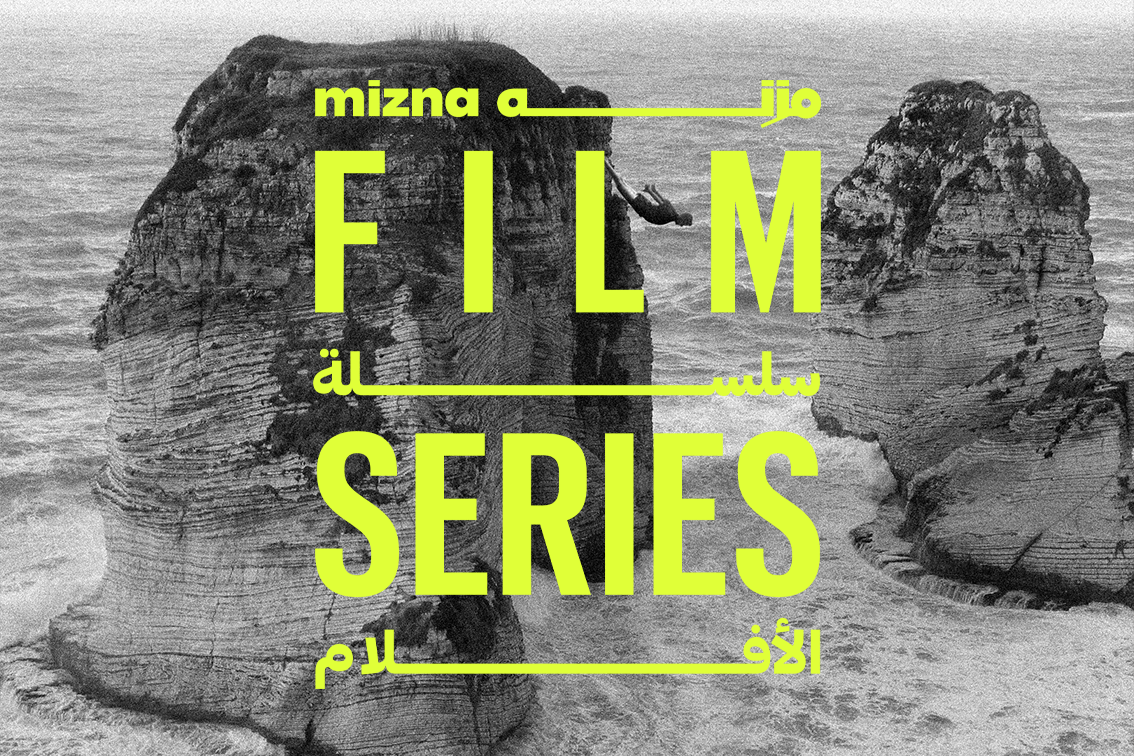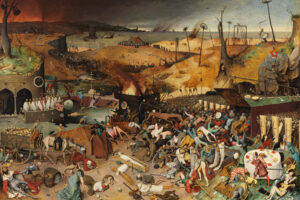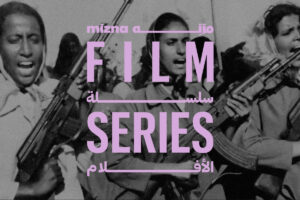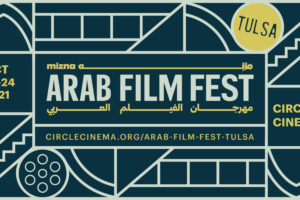
June 2, 2022
Mizna Film Series Summer 2022: Joana Hadjithomas and Khalil Joreige Retrospective
The Mizna Film Series is a monthly selection of programs, marking our first venture into year-round curated film programming. While our annual Film Fest focuses primarily on the works of contemporary artists, the Mizna Film Series provides a space to expand our regular film programming to include screenings, critical essays, filmmaker interviews, and discussions exploring revolutionary forms of cinema from the SWANA region and beyond. This series is presented virtually and in-person in collaboration with Trylon Cinema. Learn more about the Mizna Film Series here.
This summer’s series presents a retrospective of the collaborative film projects of Joana Hadjithomas and Khalil Joreige. Often blending history and fantasy, Hadjithomas and Joreige’s work captures the mood and contradictions of Lebanon in the post-war moment. They use film to untangle representation from its referent, and their work engages the construction of memory from fact and fiction.
In June, July, and August, Mizna will screen a curated selection of Hadjithomas and Joreige’s films, culminating in September with a filmmaker visit and discussion of their latest narrative feature Memory Box, which will open the sixteenth Twin Cities Arab Film Festival at the Walker Art Center.
As always, the Mizna Film Series will screen monthly at the Trylon Cinema in Minneapolis, MN on the fourth Wednesday of each month. Each film will also screen online at our virtual cinema. Online screenings will be available to view worldwide.
Tickets + Passes
In-person Trylon tickets: $10
Virtual Tickets: Pay what you can, $5 suggested donation
Virtual Pass (3-pack) : $20
UPCOMING
AUGUST 24–28, 2022: JE VEUX VOIR (I WANT TO SEE) + BARMEH (ROUNDS)

JE VEUX VOIR (I WANT TO SEE) (dir. 2008)
July 2006. A war breaks out in Lebanon. A new war, but not just another war. This war crushes the hope for peace and the momentum of a generation. Young Beiruti artists no longer know what to write, what stories to recount, what images to show. They ask, what can cinema do? Hadjithomas and Joreige decide to address this question and translate cinema’s possibilities into reality, and they travel to Beirut with an icon, an actress who symbolizes cinema and its potential: Catherine Deneuve. In the film, she meets with Rabih Mroué, an actor who always makes an appearance in Hadjithomas and Joreige’s work, and together, these two actors drive through the regions of Lebanon devastated by the conflict, areas that remain inaccessible to most citizens. Through the presence and meeting of these two stars, the filmmakers hope to find the beauty in Lebanon which the eye can no longer perceive. I Want to See is the beginning of an unpredictable and unexpected adventure.

BARMEH (ROUNDS) dir. 2001
Rounds is a video featuring Rabih Mroué, filmed driving through the streets of the city. Beirut is evoked through the driver’s stories and through sound, but the city is never seen; it is rendered invisible in an overexposed whiteness. However, the presence of Beirut is confirmed through ongoing discourse. Like his driving, Mroué’s stories spin in a circle. He is like a ghost, haunting the streets of a city where a reconstruction project is in progress in a strange post-war period.
In-person screening of Je Veux Voir (I Want to See) and Barmeh (Rounds) takes place at Trylon Cinema on Wednesday, August 24, 2022 at 7pm.
Je Veux Voir (I Want to See) and Barmeh (Rounds) is available virtually US ONLY August 25–28, 2022. Limited tickets available.
PAST
JUNE 22-26, 2022: ISMYRNA + THE LOST FILM

ISMYRNA (dir. 2016)
Joana Hadjithomas met the artist and poet Etel Adnan at the end of the 1990s. They quickly grew close, bound by links to a city they had never been to: Smyrna formerly, known today as Izmir. Hadjithomas’s paternal Greek family were forced into exile from Smyrna by the Turkish armies after the end of the Ottoman Empire. Adnan’s Greek mother was born in Smyrna, married to a Syrian officer of the Ottoman Army and exiled to Lebanon after the fall of the empire. Adnan and Hadjithomas lived in an imaginary Smyrna without ever setting foot there. They find themselves engaged in questions around the transmission of history, and interrogate their attachment to objects, places, and constructions of imaginaries without images. Their personal experiences and stories serve as a background to the region’s changes after the fall of the Ottoman Empire.

THE LOST FILM (dir. 2003)
One of Etel Adnan’s favorite films, The Lost Film follows filmmakers Hadjithomas and Joreige as they search for a copy of their first feature film, which disappeared in Yemen on the day of the tenth anniversary of the reunification of North and South. A year later, they travel to Yemen to track down the missing film. This inquiry takes them from Sana’a to Aden, a personal quest that centers on the image and on their status as filmmakers in this part of the world.
JULY 27–31, 2022: A PERFECT DAY + RAMAD (ASHES)

A PERFECT DAY (dir. 2005)
This film tracks twenty-four hours in the life of Malek, who lives in Beirut. Malek has both sleep apnea, a syndrome which interrupts his breathing during sleep, and narcolepsy. He lives with his mother, Claudia, who has still not accepted his father’s disappearance 15 years earlier. She stays at home in case her husband returns. Malek drives around the city in search of Zeina, the woman he loves, but who no longer wants to see him. Each of them is trying to live with a void of lost love, but today may be the “perfect day” to lay their ghosts to rest. Malek has convinced his hesitant mother to declare her husband officially dead. And that evening, in a trendy nightclub, Zeina looks ready to give Malek a second shot.

RAMAD (ASHES) (dir. 2003)
Nabil returns to Beirut with the ashes of his father who died abroad. He tries to overcome his bereavement while his family insists on respecting rites and customs by burying a non-existent corpse.












